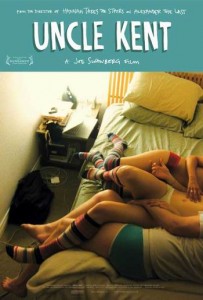 “Uncle Kent” is Joe Swanberg’s fifth time at the directing helm, the sixth if you count his co-directing “Nights & Weekends” with Greta Gerwig [“Greenberg”]. This film also happens to be his fourth time working with IFC in distributing his films. After the VOD success of “Alexander The Last” which ran concurrently to the 2008 South by Southwest Film Festival [SxSW], Joe had no trouble setting the same course at this year’s Sundance Film Festival. “Uncle Kent” is the story of single 40 year old animation artist Kent (Swanberg film veteran Kent Osborne) who invites Kate, an attractive New Yorker he meets over the internet, to fly in and spend the weekend. What results is a series of strange and funny, but utterly human, episodes. It’s a very contemporary story and, in its way, shows a filmmaker, like his main character, trying to move from behind technology and reach out for human emotional connection.
“Uncle Kent” is Joe Swanberg’s fifth time at the directing helm, the sixth if you count his co-directing “Nights & Weekends” with Greta Gerwig [“Greenberg”]. This film also happens to be his fourth time working with IFC in distributing his films. After the VOD success of “Alexander The Last” which ran concurrently to the 2008 South by Southwest Film Festival [SxSW], Joe had no trouble setting the same course at this year’s Sundance Film Festival. “Uncle Kent” is the story of single 40 year old animation artist Kent (Swanberg film veteran Kent Osborne) who invites Kate, an attractive New Yorker he meets over the internet, to fly in and spend the weekend. What results is a series of strange and funny, but utterly human, episodes. It’s a very contemporary story and, in its way, shows a filmmaker, like his main character, trying to move from behind technology and reach out for human emotional connection.
Joe Swanberg spoke with me in between screenings in Park City.
Adam Schartoff: How did “Uncle Kent” end up being chosen as one of the Sundance Selects?
JOE SWANBERG: I have a really great ongoing relationship with IFC. “Uncle Kent” is the fourth film of mine that they are putting out. We’ve always been up for trying new things, to push the envelope with technology and alternative ways of distributing my films.
 Two years ago they put out a film of mine called “Alexander The Last” and we did a day & date VOD premiere with the South by Southwest Film Festival. When “Uncle Kent” got into Sundance, it just made sense that we would try it again here. We hope to reach a wider audience and keep pushing in this direction.
Two years ago they put out a film of mine called “Alexander The Last” and we did a day & date VOD premiere with the South by Southwest Film Festival. When “Uncle Kent” got into Sundance, it just made sense that we would try it again here. We hope to reach a wider audience and keep pushing in this direction.
AS: How does it feel distributing “Uncle Kent” through an alternative channel, not just going to the theatrical route?
JS: I had the experience of going theatrical in 2007 when IFC released “Hannah Takes The Stairs”. It was great. I was able to fulfill that life long ambition of seeing it play in movie theaters. I had that filmmaker fantasy experience.
At the same time, the most exciting aspect of “Hannah Takes The Stairs” was the VOD. As I was traveling around promoting the movie from city to city, doing Q&A’s at the screenings, I was getting these e-mails and phone calls from IFC telling me how great the VOD numbers were.
A lot of people are watching it; it’s doing a lot better than we expected. And ever since then I’ve realized that on the small scale of things, I can’t be that picky about how people access my work.
Frankly, the bigger challenge is letting people know that the movies even exist at this point. Without movie stars in them, and without gigantic advertising budgets. It’s been a real revelation for me because when we did the “Hannah Takes The Stairs” release, I thought the VOD would be the small additional revenue stream to the theatrical. It turned out differently. You hope to break even on theatrical, maybe not lose money.
AS: Have you noticed since “Hannah Takes The Stairs” that it is much harder going theatrical? Or is it that VOD just feels right for character-driven films like you make?
JS: I’m not someone who’s precious about a theatrical release. When I finish a movie and I have a conversation with IFC and we talk about distributing it, going theatrical is not even a sticking point in those conversations. It’s more like, how do we make sure the VOD does well? How do we position the film the best way possible?
I’m 29 years old and I came into making indie films in the 90s when Sundance meant you bring your tiny movie here, you sell it for a lot of money, and you have a big theatrical release. That was the model when I was going to film school. But, you know, it’s kind of nice to have a new model and to evolve from that old idea. It’s still happening to some filmmakers.
But even the films that are selling at Sundance over the last few years, I’ve seen them struggle theatrically. I think it’s time for a new mythology to develop around indie film and how indie filmmakers go about making the deal. I think VOD is going to continue to be the way that people can access small films. Now that doesn’t have to mean you don’t get to show your film on a big screen in front of an audience. I don’t think that the theatrical has to compete with VOD but I can see it helping to promote VOD.
AS: Are you more involved now with how your films are marketed? Were you always?
JS: I always tried to be but now I’m a lot smarter, a lot more realistic about how people are going to watch the films. I’ve also learned what works best on VOD. I think it’s a unique format. People are just figuring out how to best cut a trailer that will appeal for a VOD audience. These are things I had no idea about when I first started making films.
AS: Ultimately it seems that no one really knows how films are going to reach mass audiences, especially independent films.
JS: I think that’s right. I’m personally excited to be in the Wild West. I think that in the next few years a couple of people are going to get it right. They’re going to discover something new that really works and there’ll be a giant stampede in that direction.
In my relationship with IFC, we’ve always hoped to be on the forefront of those things rather than chasing around different strategies. It really appeals to me. It’s the same attitude of wanting to figure that out is the kind of attitude that makes you want to make independent films in the first place. It’s that mentality of separating yourself from the pack.
AS: So, for you, it’s not just about being a storyteller but how to get your stories in front of the most pairs of eyes possible.
JS: That’s right. When I’m in the actual process of making my film I’m always trying to forget about all that. And just make the best film that I can make.
As soon as it’s finished though, I think indie filmmakers need to have some ideas and have an understanding about the kind of film that they made. And to be realistic about how to get it out there. Distributors are really smart but you have to work as hard; attend screenings, promote the work. It’s a whole other second part of the job.
AS: It uses another part of your sensibilities and that’s probably a pleasant relief after the more creative side of the filmmaking process.
JS: It is. It’s about problem solving, which is gratifying.
AS: Especially if you find the solution.
JS: Yeah, that’s right.
AS: Like making a profit on your movie, so you can continue making more movies.
Article originally appeared: http://ondemandweekly.com/blog/article/vod_spotlight_on_independent_filmmaker_joe_swanberg_of_uncle_kent

